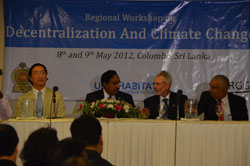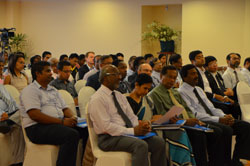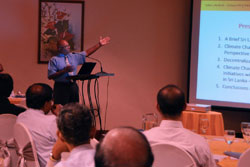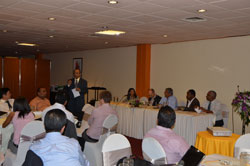Regional workshop on Climate Change and Decentralization
Regional workshop on Climate Change and Decentralization
 May 2012, Colombo, Sri Lanka. A two day regional workshop on Climate Change and Decentralization was held in Colombo, Sri Lanka, on the 8th and 9th of May 2012 at Hotel Galadari. Organized by UN-Habitat, the United Nations Human Settlements Programme, in partnership with MaRGG, Management Resources for Good Governance and the Ministry of Environment of Sri Lanka, the workshop brought together sector interest groups from Sri Lanka and seven other regional nations from the Asia Pacific – Cambodia, Lao PDR, Myanmar, Nepal, Philippines, The Pacific Islands and Vietnam.
May 2012, Colombo, Sri Lanka. A two day regional workshop on Climate Change and Decentralization was held in Colombo, Sri Lanka, on the 8th and 9th of May 2012 at Hotel Galadari. Organized by UN-Habitat, the United Nations Human Settlements Programme, in partnership with MaRGG, Management Resources for Good Governance and the Ministry of Environment of Sri Lanka, the workshop brought together sector interest groups from Sri Lanka and seven other regional nations from the Asia Pacific – Cambodia, Lao PDR, Myanmar, Nepal, Philippines, The Pacific Islands and Vietnam.
Inauguration Ceremony
The workshop was declared open by Hon. Anura Priydarshana Yapa, the Minister of Environment, who said “Sri Lanka faces overabundance of Climate related challenges today. Among the major impacts of climate change in Sri Lanka are soil erosion and land degradation, pollution of inland waters, Loss of biodiversity and depletion of coastal resources.” He appreciated the strong partnership between the ministry and UN-Habitat, which has resulted in the formulation of the National Climate Change Policy.
 Mr. Laxman Perera, UN-Habitat Country Programme Manager, highlighted that densely populated and developed areas such as cities, face the heaviest burdens from the impacts of climate change. The impacts of related disaster affect the poorest communities more adversely, as economic and social barriers confine them to the most vulnerable areas. 70% of Sri Lanka’s urban population and 80% of its economic infrastructure networks are concentrated in coastal cities, highly vulnerable to climate change impacts such as sea-level rise, flooding, salination of water resources, storm surges, cyclones and droughts.
Mr. Laxman Perera, UN-Habitat Country Programme Manager, highlighted that densely populated and developed areas such as cities, face the heaviest burdens from the impacts of climate change. The impacts of related disaster affect the poorest communities more adversely, as economic and social barriers confine them to the most vulnerable areas. 70% of Sri Lanka’s urban population and 80% of its economic infrastructure networks are concentrated in coastal cities, highly vulnerable to climate change impacts such as sea-level rise, flooding, salination of water resources, storm surges, cyclones and droughts.
Mr. Chris Radford, Senior Human Settlement Officer of UN-Habitat highlighted that according to UN-Habitat’s “Cities and Climate Change: Global Report on Human Settlements, 2011”, there could be as many as 200 million environmental refugees worldwide by the year 2050, if cohesive and sustainable action is not taken to mitigate and respond to climate change issues at global, national and local levels. Mr. Douglas Keh, UNDP Country Director also spoke at the inauguration ceremony.
The Workshop
 Over 60 decision-makers and practitioners from national and local government agencies, international and national development agencies, community organizations and academia, shared knowledge and experiences towards identifying strategies for better decentralization of climate change action.
Over 60 decision-makers and practitioners from national and local government agencies, international and national development agencies, community organizations and academia, shared knowledge and experiences towards identifying strategies for better decentralization of climate change action.
Facilitated by Mr. Bernhard Barth and Mr. Kibe Muigai, technical experts from UN-Habitat headquarters, as well as Mr. Saman Senanayake, a leading local practitioner, the day one dialogue centered on presentation of country papers, and how climate change initiatives can be better implemented through localized participatory approaches and multi-level governance. On day two the participants explored ways forward through working group sessions utilizing UN-Habitat devised International Guidelines on Decentralization.
The Sri Lanka country paper presented at the workshop was based on a comprehensive scoping study on the quality & efficacy of political, administrative and fiscal decentralization in Sri Lanka to support sub-national level climate change adaptation and mitigation initiatives.
 The diversity of the sectorial representation ensured that the importance of both the Vertical Decentralization, i.e. multi-level governance, and Horizontal Decentralization, i.e. civic society interest groups at city, provincial and national levels, were well reflected in the ensuing “Conclusions and Recommendations”. A comprehensive report will now be prepared by UN-Habitat and MaRGG, which will help guide the regional Climate Change City Initiatives (CCCI) strategy of UN-Habitat, and will provide valuable inputs in formulation of policy, strategy and action plans for all sector stakeholders in Sri Lanka and the region.
The diversity of the sectorial representation ensured that the importance of both the Vertical Decentralization, i.e. multi-level governance, and Horizontal Decentralization, i.e. civic society interest groups at city, provincial and national levels, were well reflected in the ensuing “Conclusions and Recommendations”. A comprehensive report will now be prepared by UN-Habitat and MaRGG, which will help guide the regional Climate Change City Initiatives (CCCI) strategy of UN-Habitat, and will provide valuable inputs in formulation of policy, strategy and action plans for all sector stakeholders in Sri Lanka and the region.
